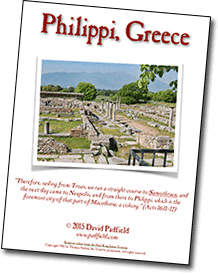Free Booklet On Philippi, Greece

During his second evangelistic journey, Paul visited the city of Troas in what is now western Turkey (Acts 16:6–12). Leaving the seaport of Troas, Paul sailed to the northwest and came to Neapolis, a journey of about 100 miles. This city is known today as Kavalla, Greece. Neapolis was the regular landing place for those who desired to travel by the Egnatian Way, the great Roman military highway stretching some 490 miles across Macedonia, linking the Adriatic with the Aegean Sea. Leaving the seaport of Neapolis, he traveled north to Philippi, which was about ten miles inland. At Philippi, Paul preached the gospel first to Lydia and her household, then to the Philippian jailer and his family.
Philippi is first mentioned in the New Testament in connection with Paul’s first evangelistic journey (Acts 16:11–40). Lydia, a seller of purple, and her household were the first fruits of the gospel in Europe (Acts 16:13–15). Paul and Silas were arrested and thrown into prison (Acts 16:16–24). Paul was very humiliated by his treatment and later told the Christians at Thessalonica how he was “spitefully treated” at Philippi (1 Thess 2:2). The jailor and his household were also converted here (Acts 16:25–34).
The book of Philippians was one of the “prison epistles” of Paul. Epaphroditus was sent by the Philippian church to deliver gifts to Paul and to help him; he became ill and nearly died (Phil 2:25). Euodia and Syntyche were urged to be of the same mind (Phil 4:2). Clement had been a fellow-worker with Paul (Phil 4:3). In his epistle to the Philippians, Paul sent greetings to the brethren from the saints “who are of Caesar’s household” (Phil 4:22).
Philippi prospered during the 5th and 6th centuries as a place associated with the memory of the apostle Paul. Catastrophic earthquakes in the early 7th century AD., and invasions by Slavs and Bulgars brought the city into a state of decline. After the Turkish conquest (after AD 1387), the city and its fortifications were abandoned and fell into ruin. Having a great past does not guarantee a promising future. Like so many places in the lands of the Bible, you can see great monuments and relics of the past, but in the background, you will see the minaret of the local mosque from which the muezzin calls the faithful to prayer. This is what happens when people cease searching the Scriptures daily.
Free Bible Study Guide
The Biblical City Of Philippi, Greece (2nd edition, 2015). A detailed outline describing the city of Philippi, its significance in Biblical times, and its archaeological ruins. This second edition includes color photographs of the area (PDF file size: 2.4MB).
